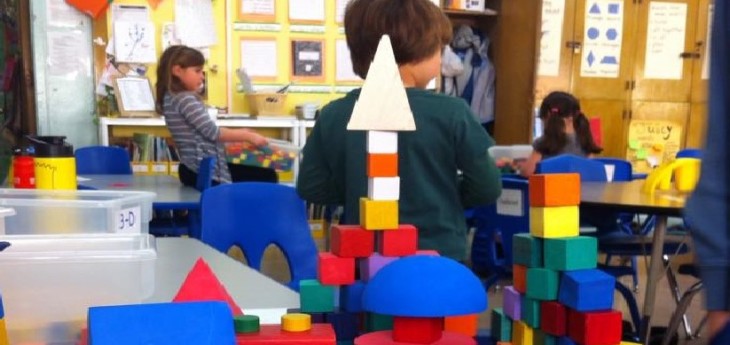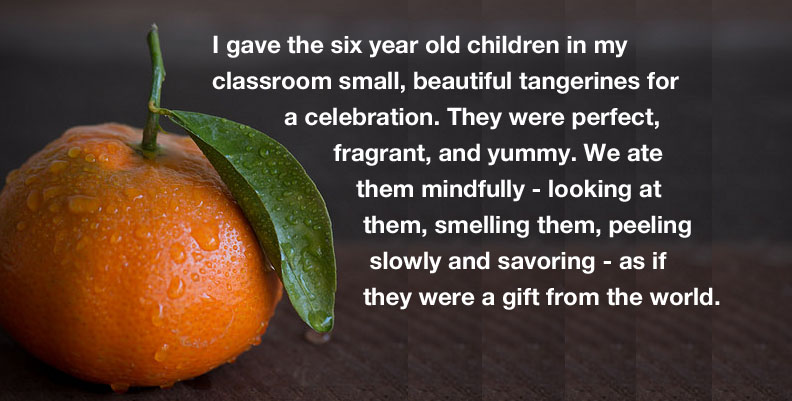By Michelle Gunderson.
The children in my first grade classroom play. There are no academic centers where a teacher rings a bell and children move from activity to activity. That might look like play, but it is not. We have body breaks where we sing and dance, but we do not call it play because it is not. We play – pure and simple – and it is self-selected, student-driven, and sustained for 60 minutes so that the play is deep and meaningful.
Last week as I watched one of my students lost in play, washing one of our baby dolls, I was reminded how vital play is to a child’s sense of well-being, language and physical development, and sense of identity. In that moment in time in her imagination, she WAS the baby doll’s mother. Just a few feet away several children were building in our block center. The play there becomes so involved that the children have started building what they call “worlds”. Dig back into your childhood – you remember what this felt like.
I recently sat on a panel with early childhood experts, Denisha Jones, Nancy Carlsson-Paige, and Susan Ochshorn, at the Network for Public Education conference. It should seem ridiculous that we would be in a position of having to defend play – something so integral to human development – at an open forum. But with the onslaught of standards-based learning and a nationwide proliferation of testing, those of us who work with young children and have their care in our hands find ourselves fighting for something we consider an essential right of childhood. Here is the video of our panel:
As a union activist I see play as an organizing issue that unites us in our fight for schools that our children deserve. It is an issue that most of us care deeply about, and there is a mountain of research in child development that supports our position that play be a sheltered part of a child’s school experience.
One of the things that impedes our organizing around play is that we often talk about how imperative play is for a child’s well-being, but we seldom clarify the role of an expert adult in producing meaningful play in a classroom. Many believe that if play is natural to children it should just occur without the need of adult support. Nothing could be further from the truth, and I have learned this the hard way.
I usually explain the importance of adult guidance in play with a birthday party scenario. Any of you who are reading this that have experienced a 6 year old birthday party will probably agree that after two hours with 20 or more first graders you wish you were in a fetal position on the couch. For some reason, that I have yet to see explained in research, children left to their own devices in a play situation soon devolve into a Lord of the Flies situation.
It takes expert adult knowledge of children’s emotional needs, play space organization, teacher involvement in problem solving, and a true understanding of cognitive processes for an educator to plan for play that is productive.
My first job after receiving my teaching certificate was working in a preschool for the navy at the Glenview Naval Air Station. It was a beautiful facility stocked with everything that a school community could need. The only problem was, the three-year-olds I was working with were expected to engage in an academic curriculum. I soon found out that our days were torturous – the children rebelled, were often unhappy and sad, and acted out in ways that were difficult to overcome. I lasted 3 months.
Luckily I was awarded a fellowship in the early childhood program at the National College of Education in Evanston where I learned developmentally appropriate practice from titans in the early childhood field – Betty Weeks and Paula Jorde-Bloom. Without this specialized knowledge I could not be the teacher I am today. For this reason, I am a strong proponent of early childhood experts as teachers of children through age eight.
I posit that not only is play of vital concern for children, it is also a worksite issue. Educators that are forced to teach young children in schools where play is not valued are also harmed. The work becomes impossible when children have academic learning imposed on them all day long. It is a system set up for failure of both kids and adults.
So if we follow this to a logical conclusion, play in every early childhood classroom should be an organizing concern.
We were able as a first grade team to preserve time for play during our school day through good old-fashioned union organizing. Our neighborhood Chicago Public School has an extremely strong internal union structure where the teachers trust each other to establish robust curriculum and a fair workplace. In this environment our first grade team decided when the school day extended by an hour that we were going to schedule “choice time” – a daily hour of self-selected play. This agreement is a bedrock of our solidarity (a key principle of union organizing). All four of us on the first grade team would defend a child’s right to play, and we would not waiver.
Next we did what any good organizer would do, we educated our allies (parents in this case) through our weekly newsletter, website, and curriculum night. I post a photo display of children playing with explanations of why the play is important and what educational role it fills. For example, I placed photos in our hallway of children working in our sewing center with explanations about the visual planning involved, the fine motor skill gained, the craft knowledge acquired, and the personal satisfaction of producing beautiful work. That is the work of childhood.
I think that if play were eliminated from our daily routine the parents of our students would rebel with pitchforks and torches. We have made a strong case for this learning, and the parents know firsthand that their children are happy.
Protecting play in our classrooms at our school is micro level work, but it is an organizing point that needs to be addressed nation-wide. When we organize around play as a critical issue for the well-being of children we improve worksite conditions. We make a difference in children’s lives, in workers’ lives, and in the cultures of our school sites.
Michelle Strater Gunderson is a 29 year teaching veteran who teaches first grade in the Chicago Public Schools. She is a doctoral student at Loyola University in Curriculum and Instruction.






Christine Langhoff
Thank you for posting Michelle’s article, Anthony! A big problem at #NPE16NC was that here were many excellent workshops going on simultaneously. My thanks to Vincent Precht at schoolhouselive.org for the chance to see this panel.
Sarah McIntosh-Puglisi
How long is your day?
Michelle Gunderson (@MSGunderson)
7 hours
Larry Lawrence
Wow! Good article! It expanded my concept of how we (a team of teachers) worked with out lower elementary level (5-8 years olds) students. We had a period in which for one hour I met with 60 students (so the others teachers could have small reading groups and, then, we switched) in a “choice” environment. I would meet with this large group sitting on a rug and go over the available choices and the students would go at it! A important point is that almost all these young children had experienced a choice atmosphere in our Early Childhood Unit (4-6 year olds) and were sophisticated choice-makers (a true skill!). I hadn’t thought of labeling this “play” until I read Michelle’s article. Never too old to learn!!
TUStudent
I truly believe children need a longer amount of time for self-selected play in the classroom. Play is such a meaningful aspect in a child’s life and when they are given time to just explore and use their creativity, they learn so much. I think educators are so scared of giving children this extra time because they think children won’t learn anything and therefor won’t do well on an assessment which then makes them look like a bad teacher. However, children are learning important life skills when they are given the freedom to play. Playing is a part of a child’s childhood. If children are given time to use their talents and creativity they may be more engaged during instructional time or even have a better attitude towards school. I have seen my own students benefit from longer play time and have seen behaviors disappear. I have seen children learn how to have a “job” and be in charge. I have seen students use engineering skills to build communities. These activities take time and require thinking and planning and children can’t engage in these activities when they are only given 15-20 minutes of recess.